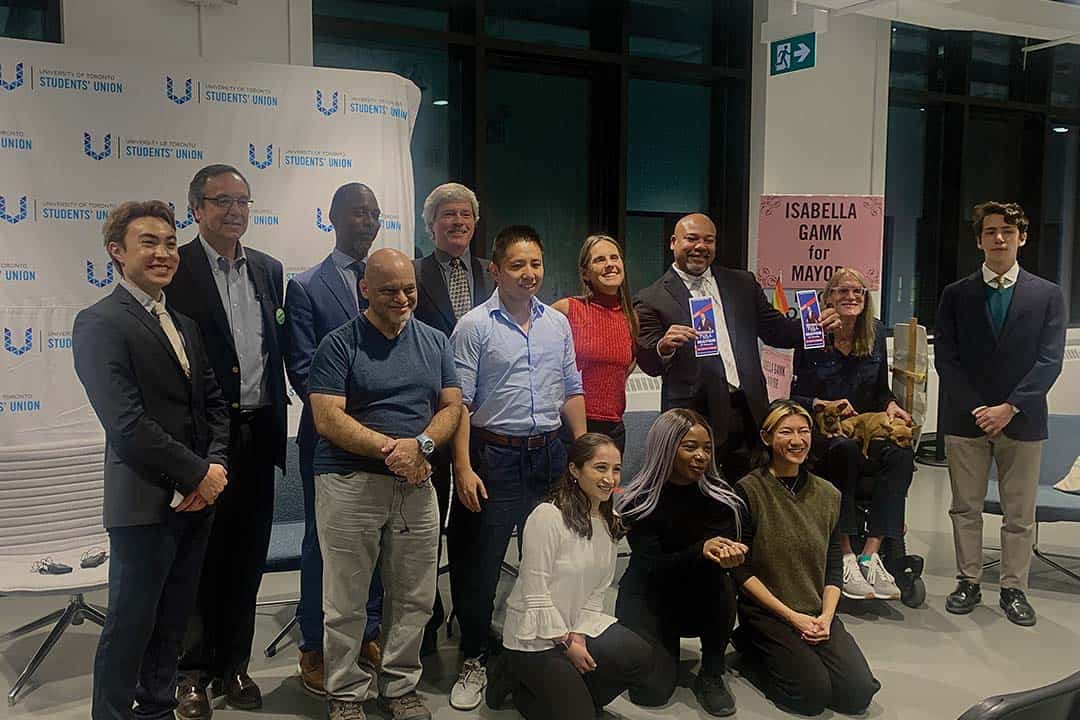On October 11, U of T’s School of Cities partnered with CBC Toronto to host several of Toronto’s former mayors in a discussion regarding Premier Doug Ford’s new strong-mayor system. Adam Vaughan, a former MP for Spadina—Fort York and a Canadian Urban Leader with the School of Cities, hosted the event at Innis Town Hall.
Former mayors David Crombie, Barbara Hall, and John Sewall were in attendance; fellow former mayors Art Eggleton and David Miller joined them via Zoom. All five living former mayors of Toronto sat down to share their perspectives and experiences from their collective decades of governing Toronto.
Bill 3 — the Strong Mayors, Building Homes Act — received royal assent in September and Ford’s strong-mayor system will come into effect on November 15. This system grants a host of new powers to the mayors of Toronto and Ottawa because it centralizes power within municipal governments.
The strong-mayor system
The bill allows mayors to circumvent their city councils with a veto and bypass majority opposition. In turn, a two-thirds majority of the council can still strike down a mayoral veto. However, the mayor’s veto is limited specifically to the interests of the provincial government.
Ford’s legislation also allows a “strong mayor” to appoint most municipal department heads, with notable exceptions including the city’s auditor general, police chief, and medical officer of health. Additionally, mayors are granted responsibility for preparing the city’s budget and are empowered to select committee chairs.
According to Ford’s provincial government, the strong-mayor system helps accelerate housing development by promoting efficiency and decisiveness in local government. The ability to bypass city council is intended to cut through bureaucracy and foster development.
Toronto’s incumbent mayor, John Tory, has supported the expanded powers, saying that he welcomed measures to speed up the process of building more homes.
Concerns with the new legislation
Since it was announced in July, the strong-mayor legislation has drawn controversy.
At Innis Town Hall, Toronto’s former mayors unanimously expressed strong opposition to the bill. “The legislation now passed is both unnecessary and a threat to local democracy,” Eggleton remarked. Miller agreed, saying that “no mayor of Toronto worth his salt would accept or advocate for the powers that the province has just given them.”
To Miller, the strong-mayor system represents a provincial attack on local democracy: “Why should the province tell the people of Toronto what they want in their city and how to build it?”
Importance of student engagement
Vaughan said that while U of T students have been quick to advocate for rights at the global and national level, “they need to be just as engaged locally because their lives are actually directly more impacted.”
He warned that the municipal election has direct consequences for U of T students, saying, “a weak City Council produces a weak transit system and a weak housing system.”
Vaughan called for students to make themselves heard: “Some of the best decisions in our city have been made when students’ voices have stood up and called for change.”
He reminded students to vote in the upcoming municipal election scheduled on October 24: “If you don’t vote, someone else will. And that’s the quickest way to lose your voice in our democracy.”Toronto’s municipal election is on Monday, October 24. Voting runs from 10:00 am to 8:00 pm.


